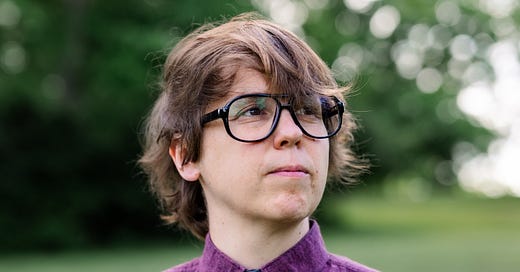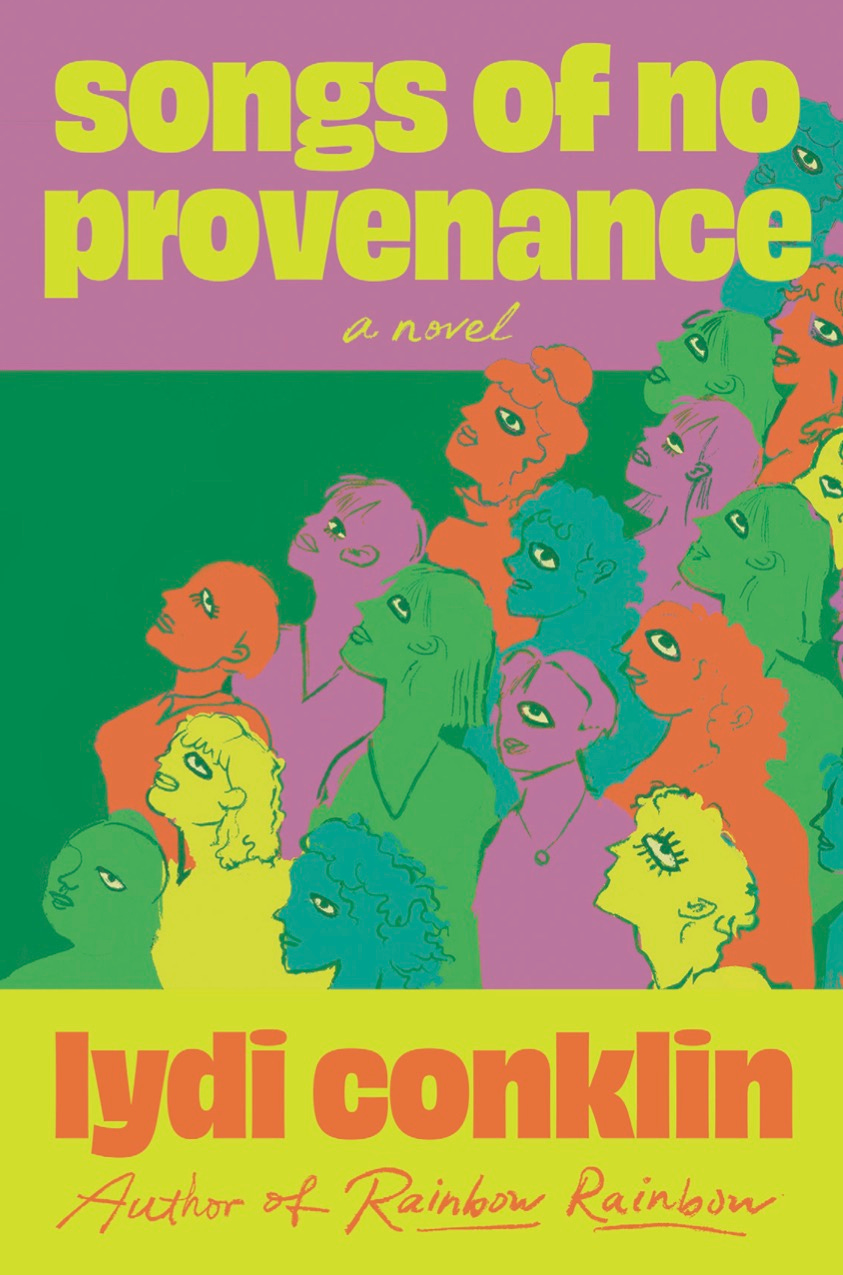INTERVIEW: Lydi Conklin by Brittany Ackerman, "Asking For a Friend: Does Art Heal Us?"
On the Hunger for Recognition and the “Sticky Shit” of being an Artist with Lydi Conklin on their novel, Songs of No Provenance.
I heard Lydi Conklin read from “Pioneer” back in 2022. It was for a Birthing the Book event at The Porch in Nashville, Tennessee. On the surface, it sounded like a funny story. Us Elder Millennials remember the Oregon Trail and other early Internet games all too well. But there was something in the voice of the protagonist that resonated, a deep longing, a hollow place in the soul, reaching out for meaning. When I got home that night, I opened up my newly signed copy of Rainbow Rainbow and read the story in its entirety.
The story centers around Coco, a fifth-grader participating in a school reenactment of the Oregon Trail. Faced with the expectation to portray a traditional female role, Coco chooses to be an ox instead. It’s a story about the complexities of gender identity in childhood, of self-discovery, a quiet pull toward something unnamed.
“It’s all right, Coco,” said Mrs. Harper…Coco took in a breath. “That’s not my name anymore.”
Coco is not healed in the end. But rather, a door to healing opens.
In Songs of No Provenance (Catapult, 2025), Joan Vole is a protagonist in need of healing. The novel is wonderfully unconventional and refreshingly unexpected, with moments of playful wit and pure joy. Above all, the story tackles compelling questions about art, desire, identity, and ownership. How do ego and the impulse to possess disrupt the ideal of a pure creative process? In what ways do artistic and erotic passions overlap and shape each other? And what, if anything, do artists owe to those who consume their work?
Let’s ask Lydi Conklin…
Brittany Ackerman: Can we please talk about the “sticky shit,” aka ego? How does one separate their art from themselves and strip down the work to writing alone? In other words, I’d love to hear your thoughts on ego, as in, to what extent does ego help or hinder a writer's ability to tell the truth — not just about the world, but about themselves?
Lydi Conklin: That’s such a great question, and so much of what the book is about! At the beginning of the novel, Joan does a horrible thing which rises from the bad side of her ego: jealousy and panic and fear of abandonment, all arising from her mentee and best friend achieving a level of fame above her own. Joan decides that she has to completely strip ego from music in order to enjoy it, that she can’t make music anymore but can still enjoy it through songs that exist without authors. This is of course an extreme reaction, but it follows an extreme event, and Joan is an extreme person. She eventually comes around to a different way of seeing art and ego. For me, I think ego can definitely get in the way of the work if you let it. But you also need it in order to make art. So there is a kind of balancing act that you have to reach.
BA: How has living in Nashville—such a music-saturated city—influenced your understanding of artistic ambition, identity, and community, especially as it relates to Joan’s complicated relationship with music and fame?
LC: I was so excited when I got a job in Nashville midway through writing this book. I went to so many shows, and dated a musician, and immersed myself in this magical city where everyone is a musician, even those where you don’t expect it. I learned a lot of bonus intel about the life of a musician from talking to musicians and watching shows, little silly details that added authenticity to the book. But I also just absorbed that feeling of music being king. In Nashville there are people playing live music in the airport, in hotel lobbies, at student readings, wherever you go. Joan lives her life in service to music, even when she gives it up she’s obsessed, and it was really cool to immerse myself in a place that sees the world the same way.
BA: Joan is a musician, but she moves through the world like a writer—driven by voice, story, and the need to be heard. Do you see musicians and writers as kindred figures, especially in how they perform identity and seek meaning through language?
LC: Yes, definitely. At least songwriters! I know there are musicians who don’t write, too, but Joan is first and foremost a songwriter and her songs are very narrative and lyric-heavy. I think there are songwriters who don’t have such a writerly approach as Joan does, though. She’s kind of cerebral even as she’s also completely feral. But Joan isn’t the type of musician to noodle out a song in an hour, she’s the kind to be up for days chasing the dragon. I’ve always been friends with musicians and I think we have a similar way of seeing the world. I maybe have a bit more wildness than some writers that lets me understand them more.
BA: Throughout the novel, Joan turns to art in moments of crisis—but it’s never quite a salve, and sometimes it deepens the wound. Do you think art has the power to heal us—or is that just another story we tell ourselves?
LC: I think sometimes art can heal for sure. I have definitely worked through past situations in my life by writing about them. My next novel was motivated by me writing about someone I had lost and wanting to preserve them in the form of a book and thus let go of them, and it did somehow work. But sometimes writing is re-traumatizing or difficult as hell. I’ve written pieces about hard times in my life that I can barely work on. Some of them I’ve even given up forever because I could not face them every day. But even if writing can’t always heal your own wound, the hope is, perhaps, it could help someone else.
Lydi Conklin has received a Stegner Fellowship, four Pushcart Prizes, a Rona Jaffe Foundation Writer’s Award, a Creative Writing Fulbright in Poland, a grant from the Elizabeth George Foundation, work-study and tuition scholarships from Bread Loaf, and fellowships from MacDowell, Yaddo, Sewanee Writers Conference, Emory University, Hedgebrook, Djerassi, and elsewhere. Their fiction has appeared in The Paris Review, One Story, McSweeney’s, American Short Fiction, and VQR. They have drawn cartoons for The New Yorker and Narrative Magazine, and graphic fiction for The Believer, Lenny Letter, and the Steppenwolf Theater in Chicago. They’ve served as the Helen Zell Visiting Professor at the University of Michigan and are now an Assistant Professor of Fiction at Vanderbilt University. Their story collection, Rainbow Rainbow, was longlisted for the PEN/Robert W. Bingham Award and The Story Prize.






